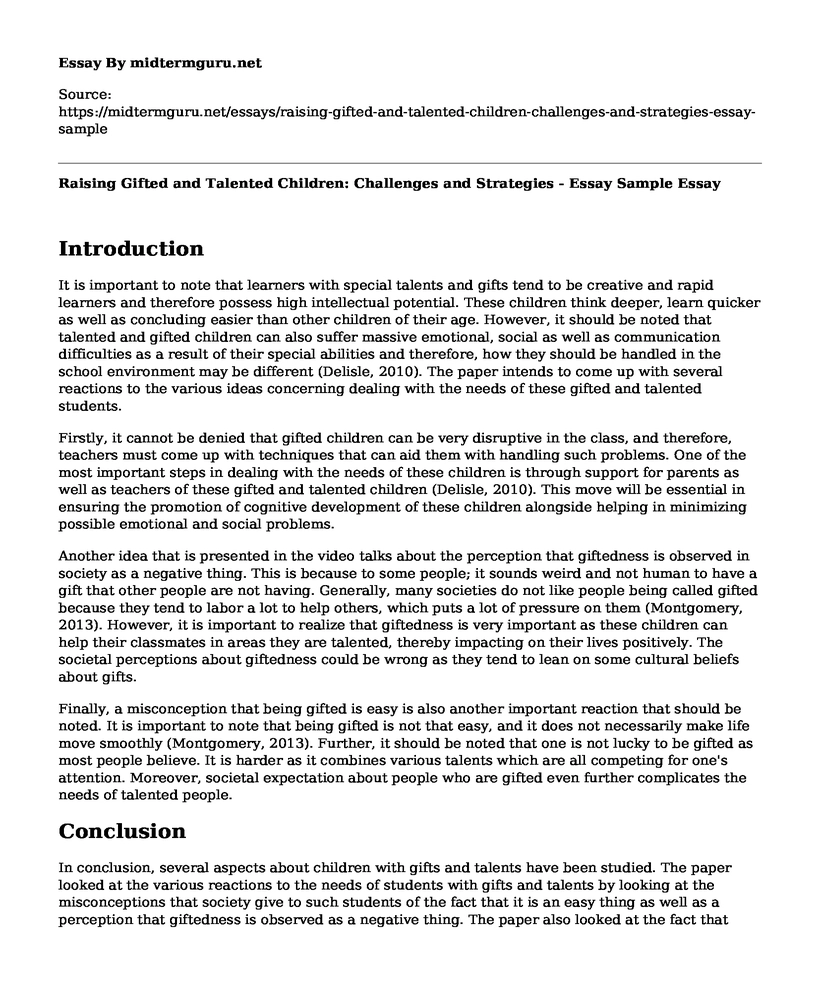Introduction
It is important to note that learners with special talents and gifts tend to be creative and rapid learners and therefore possess high intellectual potential. These children think deeper, learn quicker as well as concluding easier than other children of their age. However, it should be noted that talented and gifted children can also suffer massive emotional, social as well as communication difficulties as a result of their special abilities and therefore, how they should be handled in the school environment may be different (Delisle, 2010). The paper intends to come up with several reactions to the various ideas concerning dealing with the needs of these gifted and talented students.
Firstly, it cannot be denied that gifted children can be very disruptive in the class, and therefore, teachers must come up with techniques that can aid them with handling such problems. One of the most important steps in dealing with the needs of these children is through support for parents as well as teachers of these gifted and talented children (Delisle, 2010). This move will be essential in ensuring the promotion of cognitive development of these children alongside helping in minimizing possible emotional and social problems.
Another idea that is presented in the video talks about the perception that giftedness is observed in society as a negative thing. This is because to some people; it sounds weird and not human to have a gift that other people are not having. Generally, many societies do not like people being called gifted because they tend to labor a lot to help others, which puts a lot of pressure on them (Montgomery, 2013). However, it is important to realize that giftedness is very important as these children can help their classmates in areas they are talented, thereby impacting on their lives positively. The societal perceptions about giftedness could be wrong as they tend to lean on some cultural beliefs about gifts.
Finally, a misconception that being gifted is easy is also another important reaction that should be noted. It is important to note that being gifted is not that easy, and it does not necessarily make life move smoothly (Montgomery, 2013). Further, it should be noted that one is not lucky to be gifted as most people believe. It is harder as it combines various talents which are all competing for one's attention. Moreover, societal expectation about people who are gifted even further complicates the needs of talented people.
Conclusion
In conclusion, several aspects about children with gifts and talents have been studied. The paper looked at the various reactions to the needs of students with gifts and talents by looking at the misconceptions that society give to such students of the fact that it is an easy thing as well as a perception that giftedness is observed as a negative thing. The paper also looked at the fact that gifted children can be very disruptive and therefore teachers and parents should come up with better ways to monitor them.
References
Delisle, J. (2010). The "G" Word (Shhh!). Our Gifted, 13(3), 8. https://www.youtube.com/watch?v=sD4azls3Jdc
Montgomery, D. (2013). Gifted and talented children with special educational needs: Double exceptionality. Routledge.
Cite this page
Raising Gifted and Talented Children: Challenges and Strategies - Essay Sample. (2023, Jan 27). Retrieved from https://midtermguru.com/essays/raising-gifted-and-talented-children-challenges-and-strategies-essay-sample
If you are the original author of this essay and no longer wish to have it published on the midtermguru.com website, please click below to request its removal:
- Essay on Drug Addiction in Less Than Zero Film
- Letter to Time Magazine Regarding the Choice for the Person of the Decade - Paper Example
- Paper Example on Pamphlet Anxiety and OCD
- Guidelines for Selecting Toys - Essay Sample
- America's Students: Rising Violence & Fear of School - Essay Sample
- Making Alcohol and How it Helps in the Economy - Essay Sample
- Morality, Morals, and Intentions: An Exploration - Essay Sample







